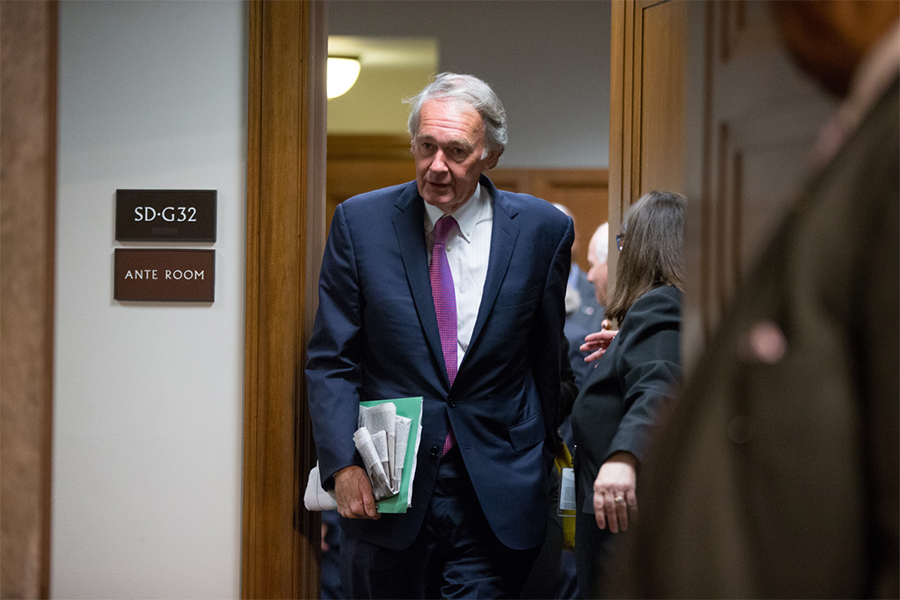Ed Markey Wants to Rescue Net Neutrality
The Massachusetts senator is helping to lead the charge to overturn the FCC's decision to scrap the rules.

Photo via AP/Andrew Harnik
He may be Massachusetts’ second most famous senator, but Ed Markey has taken center stage to defend the free and open internet.
In December, the Federal Communication Commission decided to dismantle the rules put in place by President Obama that prevented internet providers from charging higher rates for faster service and blocking certain content. The choice—which supporters say is a consumer-first approach that promotes competition—galvanized members of the technology community who argue it threatens the egalitarian nature of the digital ecosystem.
And Democrats in Congress agree. The day the FCC announcement came down, Sen. Markey stepped forward as the leader of the fight to undo it. He introduced a resolution to overturn the decision, and he’s steadily drummed up support ever since. Now, Markey’s bill stands just one vote short of passing the Senate. And in a passionate Tuesday press conference, he made clear that the push is motivated by his Massachusetts constituents.
“This is an issue that goes right to the heart of all of the buildings which are being constructed here in Massachusetts, all the way out to cities and towns all across our state,” Markey said. “Access to a free and open internet is and should be a 21st century right. Net neutrality forms the foundation of both our democracy and our economy.”
The senator went on to highlight several Boston companies, such as Wayfair and TripAdvisor, that have thrived due to the digital economy. Tom Hopcroft, president of the Massachusetts Technology and Leadership Council, said roughly one third of the Bay State’s jobs and one third of its economic output is related to the technology sector, making the issue of net neutrality particularly salient here.
Sen. Markey said Tuesday that a vote will be held on the Senate floor to overturn the FCC’s December decision, though he did not specify when. Whether that vote will swing in his favor is not yet clear, and the vote may end up being moot. All 49 Senate Democrats have indicated their support for Markey’s bill, and Republican Sen. Susan Collins also said she would vote for it. However, as of Tuesday afternoon, Democrats were still one vote short of the simple majority, and several members of the caucus took to Twitter to try to turn the tide in their favor.
Some great news: We need just one more vote, from one more Senator, to have enough votes to reverse the Trump administration’s #NetNeutrality repeal. Keeping our internet free and open to everyone could not be more important. Contact your Senators today!
— Kirsten Gillibrand (@SenGillibrand) January 16, 2018
So it’s official. Every single Senate Democrat is going to vote for the CRA for net neutrality. With Senator Collins, we are at 50. Can you guys help us find one more Republican vote so we can win this thing?
— Brian Schatz (@brianschatz) January 16, 2018
And according to Markey, the politicians’ pleas aren’t falling on deaf ears.
“Momentum is building,” Markey said. “Millennials are energized. They know the loss of net neutrality means the loss of control over the internet, which is oxygen to them. We cannot let that happen. There will be a political price to pay for those who are on the wrong side of internet history.”
If the Democrats find their elusive 51st vote and the resolution passes the Senate, it will make its way to the House of Representatives and face a steep uphill battle. The lower chamber is more conservative than the upper, having passed tax and health care bills that were too far right to have much of a shot in the Senate. A liberal-backed policy is unlikely to find much of a stronghold there. Plus, should a legislative miracle happen and the bill make it to the president’s desk, there’s reason to believe Trump would veto it. And yet, even if the measure fails, it will force the GOP to confirm their endorsement for repealing net neutrality, a stance that puts them at odds with the roughly 83 percent of Americans who support the rules.


